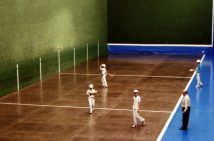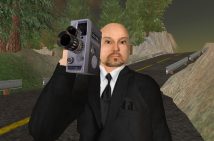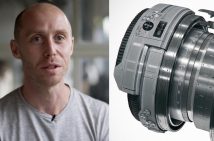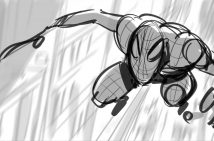Submarine Channel

Interview with Daniel Rabinowitz
Interview with Daniel Rabinowitz
Daniel Rabinowitz was one of the first filmmakers to come up with an authentic, personal vision of documentary storytelling for the web. His project is Neighborhoodfilms.com and it works like this: filmmakers from all over the world are invited to give the internet viewer an intimate look at their neighborhoods and the stories of the people who live there in 3-4 minute episodes.
Daniel started filming in his own neighborhood in San Francisco back in 2001. He continued with a new series when he moved to Vietnam , thanks to laptop filmmaking. In his new neighborhood in Saigon, the camera was like a social lubricant, fostering interpersonal connections beyond language barriers. Daniel is back in the US now where Film School is his new habitat, and of course this event spawned a new series, ‘Kinoland’. But Daniel’s professor objects: “We are not here to feed your website.” An interesting start or the premature end of a new series? Of course, from the perspective of the audience, a little drama can go a long way…
Remco Vlaanderen: Why did you start neighborhoodfilms.com?
DR: I started neighborhoodfilms.com because I had stories to tell from a particular neighborhood (North Beach in San Francisco where I was a valet). This was in the late 90’s, so I didn’t have the (technical) means to do it. My earlier films, personal documentaries about my life in some capacity, were made in 16mm, but 16mm was too expensive and too much apparatus for the type of approach I was going for. The year 2000 bore wonderful fruits: Apple’s G4, Final Cut Pro, DSL, and inexpensive small 3 chip video cameras.
It all crystallized and I had an epiphany. Tell my stories about the neighborhood through episodes on a website. I made some rules for myself, similar to dogma but for different reasons: All content comes from one geographic location – a neighborhood that becomes more and more familiar to viewers over time; no additional lights and all sound must originate from the location. These rules are meant to limit the impact the process of filmmaking has on a neighborhood and the people who dwell there.
And so, as I began shooting and cutting what would be my first series, I realized the potential of my idea was bigger then my series, that the internet was a perfect environment to create a community, a web video portal into personal neighborhoods all over the world.
That’s quite ambitious.
For me, the path of the site is obvious: have as many contributors as possible. I would even like to see the same neighborhood represented by 2 different people, which would show how we all see the immediate world around us from varying perspectives.
It could happen. Especially now that web video is bigger than ever.
You’re right. Vlogs (video logs) are surging, and web video is the media darling of the moment, but beware, corporations are already staking out real estate. Current TV is an example. They espouse to represent the voice of youth, of the everyday people. Have you been to their site? It’s all over the place. No specific themes, and it’s a competitive structure to have the “peoples'” films shown, and when they are shown they compete amongst themselves for more glory. They have savvy marketing that sells the “community environment”, but how can that be with such a competitive foundation?
So, how does Neighborhoodfilms.com compare to these corporate initiatives?
Neighborhoodfilms.com is a destination for anybody who wants to share their unique perspective of a specific place that is meaningful to them. The only criteria is that you really care about your neighborhood, and that will show through how you represent it. You could say the idealism behind my website has integrity. The site is a stopping place for people hurling through the internet in search for human connections, not in the vastly overrated online romantic sense, but on a level of watching a movie. The process of identifying, to some degree, with people who come in front of the camera, which in the best circumstances fosters a viewer to learn about themselves or the world around them, even in the most subtle way. And this is of course without the residue of corporate influenced content.
Can anyone join Neighborhoodfilms?
Those considering participating should know that production value is not put on a pedestal, there is room for technical flaws, as long as the compression holds up. I really encourage both aspiring and established filmmakers to participate. The audience is waiting, and growing.
When you moved to Saigon, Vietnam, you started a new series. What was it like to film there?
I felt pulled in a few different directions. I was very aware of being an outsider with a camera, understanding the risk of exoticizing the people in my new neighborhood. But I also was living there, so I just started hanging out until I felt that the people in the neighborhood were comfortable with my constant presence. For me, it was really about pushing the technology. I had my camera, and some great software on my G4 laptop. I shot, cut, compressed, and uploaded ten episodes while living there. At the time I really felt that I was contributing to, and in some aspects pioneering, this burgeoning medium, all the while sharing yet another chapter in my life through filmmaking.
Anyone can pick up a camera and shoot some footage of their neighborhood. But what makes a good web documentary?
Obviously it’s about having an idea, even a loose theme, in this case for an episode, and finding a cinematic direction to communicate it. It’s about individual sensibilities, how a filmmaker chooses to tell stories, both visually and with sound. Not just web documentaries, but all filmmaking requires an acute sensitivity to these always developing sensibilities. The limitations of web video are changing, but I still believe a web based film shouldn’t run longer then 5 minutes. I think I’ve found an abbreviated cinematic language that works, for the most part, that is beholding to a theme or character throughout the piece. I like quiet films where atmosphere carries as much storytelling weight as a talking person.
I would also like to say that for the web in particular it’s very important to understand the concept of the returning viewer. It is the web after all, and if you are making engaging content viewers will come back. So my suggestion is to make a film that is a sum of many short films. In my case I call them episodes. Each episode is a continuum, like a tv series, but obviously different in that it deals with real people in unforced situations (reality TV is real people but they are hand picked for dramatic affect and put in unrealistic scenarios).
You made 37 episodes in North Beach called ‘The Valet Chronicles’. Did it change your perception of the neighborhood you lived in?
I had been working as a valet in this neighborhood for a few years previous to beginning the web series, so I was very familiar with the environment and people who inhabited it. However, looking through my camera for stories, for reoccurring themes, became a catalyst for seeing more, hearing more, and therefore allowing my perspective to grow. I also formed more meaningful relationships with the people I was filming, as though they entrusted me with representing them. For the most part they appreciated it. The camera was in a sense a vehicle for conversation and friendship.
So, what’s your favourite movie, Daniel?
Oh no, the dreaded question. If I answer this I’ll feel as if I betrayed a film or filmmaker by not naming them. I love so many films, of all types and genres. For several years I’ve been admiring the films of the Dardenne brothers: La Promese, Rosetta, The Son. They come from a documentary background and have brought these sensibilities to their narrative features. They’ve found a way to heighten the ordinary, the mundane without relying on exposition or resolution. They remain steadfast to a minimalist approach: diagetic sound, sparse dialogue, no music score, and a tendency to leave their films unresolved. They kind of embody a contemporary Bresson, but less spiritual. I like the idea of hybridity, merging 2 film forms in the pursuit of finding the best way to tell a particular story. What is more compelling, engaging, or even truthful, narrative or documentary? And then there is my love for Guy Maddin’s films, but that’s for a different interview.



